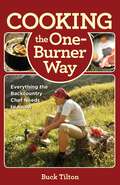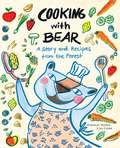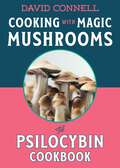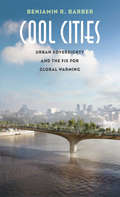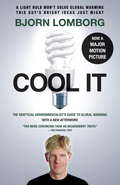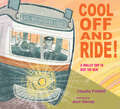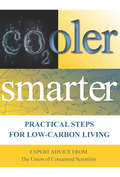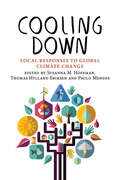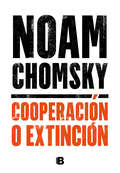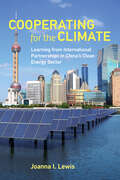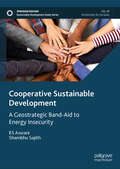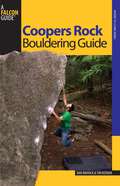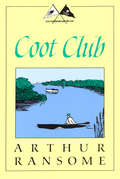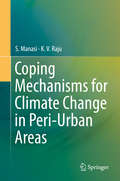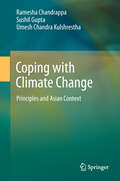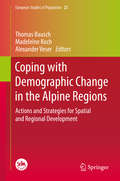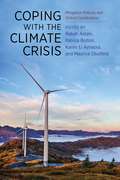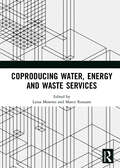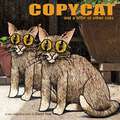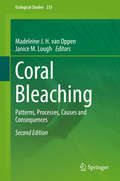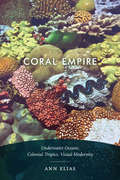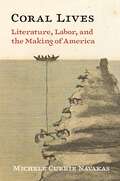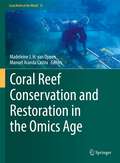- Table View
- List View
Cooking the One-Burner Way: Everything the Backcountry Chef Needs to Know
by Buck TiltonLearn how to prepare more than 150 meals - ranging from the simple to the elaborate - on top of your favorite compact one-burner stove.
Cooking with Bear: A Story and Recipes from the Forest
by Deborah HodgeThis springtime companion to Bear’s Winter Party combines fifteen kid-friendly recipes with a sweet story about friendship and food.When Bear wakes up after a long, cold winter, he makes a special spring lunch and invites Fox to join him. The food is delicious, and Fox asks Bear to teach him how to cook.They walk through the forest collecting honey, nuts and other wild ingredients, and they greet their friends along the way. With an armload of tasty foods, Bear and Fox return to Bear’s den and cook up a feast to share.Afterwards, Bear writes down his recipes so that Fox (and you!) can enjoy many marvelous meals. His cookbook — Best of Bear — offers a selection of kid-friendly, forest-themed recipes, including nut burgers, wild greens pita pizza, hazelnut–chocolate chip cookies and a wild strawberry smoothie.Readers can revisit the animal friends from Bear’s Winter Party and try out fifteen fun recipes in this playful story/cookbook from award-winning author Deborah Hodge, featuring exuberant art by Lisa Cinar.Key Text Featuresauthor’s noterecipesindexCorrelates to the Common Core State Standards in English Language Arts:CCSS.ELA-LITERACY.RL.1.5Explain major differences between books that tell stories and books that give information, drawing on a wide reading of a range of text types.
Cooking with Magic Mushrooms: The Psilocybin Cookbook
by David ConnellHead to the kitchen to make your next psilocybin experience unforgettable Magic mushrooms offer so many marvels, from transformative healing to excitement. One thing they are not known for is flavor. David Connell’s quest to make psilocybin palatable led him to develop recipes that integrate small, measured quantities of shrooms into tasty food and drink. Stop gnawing on bitter, fibrous stalks and begin your journey with a calming, pleasant snack or sip. These healthy, delicious recipes are lactose-free, with gluten-free substitutions throughout, and have no added sugars. Photographs and illustrations will inspire your explorations of food, fungi, and consciousness.
Cool Cities: Urban Sovereignty and the Fix for Global Warming
by Benjamin R. BarberA pointed argument that cities—not nation-states—can and must take the lead in fighting climate change Climate change is the most urgent challenge we face in an interdependent world where independent nations have grown increasingly unable to cooperate effectively on sustainability. In this book, renowned political theorist Benjamin R. Barber describes how cities, by assuming important aspects of sovereignty, can take the lead from faltering nation states in fighting climate change. Barber argues that with more than half the world's population now in urban areas, where 80 percent of both GDP and greenhouse gas emissions are generated, cities are the key to the future of democracy and sustainability. In this compelling sequel to If Mayors Ruled the World, Barber assesses both broad principles of urban rights and specific strategies of sustainability such as fracking bans, walkable cities, above-ground mining of precious resources, energy and heating drawn from garbage incineration, downtown wind turbines, and skyscrapers built from wood. He shows how cities working together on climate change, despite their differences in wealth, development, and culture, can find common measures by which to evaluate the radically different policies they pursue. This is a book for a world in which bold cities are collaborating to combat climate change and inspire hope for democracy even as reactionary populists take over national governments in the United States and Europe. It calls for a new social contract among citizens and municipalities to secure not only their sustainability but their survival.
Cool It: The Skeptical Environmentalist's Guide to Global Warming
by Bjørn LomborgGlobal warming has become one of the permanent concerns of our time, with ever stronger calls to combat it via drastic programs, like the Kyoto Protocol. In this highly controversial book, Bjorn Lomborg (author of the bestselling The Skeptical Environmentalist) claims that the arguments for such action are little more than scare mongering and exposes this wide range of disinformation. Global warming is happening. It's a serious and important problem and we need to deal with it in a responsible way. B...
Cool Off
by Nellie DiazA group of children in a city neighborhood try all sorts of ways to cool off on a hot summer day.
Cool Off and Ride!: A Trolley Trip to Beat the Heat
by Claudia FriddellThis historical picture book about 1930s Baltimore residents beating the heat the old-fashioned way—by riding a trolley!— is filled with fascinating information on public transit and staying cool before the advent of air conditioning.Everyone in Baltimore is hot and sticky, from little Hazel playing on the slide to the grandma knitting on the porch. So when evening comes, they all jump at the chance for a little "cool off and ride." The whole neighborhood–from the Taylor twins to Grandpa, and even the dog!—piles onto a breezy homemade roller coaster, a city trolley!In this charming, rhythmic romp, Claudia Friddell and Jenn Harney take us back to a time before air conditioning when you had to cool off any way you could. And the Cool Off and Ride Program was certainly a popular way! More than 8,000 people rode the trolleys every evening in the summer. Taking the streetcar brought the whole neighborhood together, and everyone&’s fares helped keep the Baltimore streetcars running. This STEAM title is a terrific read-aloud that will also educate kids about weather and the history of transit in the United States.
Cooler Smarter: Practical Steps for Low-Carbon Living
by David Friedman Seth Shulman The Union of Concerned Scientists Margaret Mellon Jeff Deyette Brenda EkwurzelHow can each of us live Cooler Smarter? While the routine decisions that shape our days--what to have for dinner, where to shop, how to get to work--may seem small, collectively they have a big effect on global warming. But which changes in our lifestyles might make the biggest difference to the climate? This science-based guide shows you the most effective ways to cut your own global warming emissions by twenty percent or more, and explains why your individual contribution is so vital to addressing this global problem. Cooler Smarter is based on an in-depth, two-year study by the experts at The Union of Concerned Scientists. While other green guides suggest an array of tips, Cooler Smarter offers proven strategies to cut carbon, with chapters on transportation, home energy use, diet, personal consumption, as well as how best to influence your workplace, your community, and elected officials. The book explains how to make the biggest impact and when not to sweat the small stuff. It also turns many eco-myths on their head, like the importance of locally produced food or the superiority of all hybrid cars. The advice in Cooler Smarter can help save you money and live healthier. But its central purpose is to empower you, through low carbon-living, to confront one of society's greatest threats.
Cooling Down: Local Responses to Global Climate Change
by Paulo Mendes Susanna M. Hoff man, Thomas Hylland EriksenClimate change is a slowly advancing crisis sweeping over the planet and affecting different habitats in strikingly diverse ways. While nations have signed treaties and implemented policies, most actual climate change assessments, adaptations, and countermeasures take place at the local level. People are responding by adjusting their practices, livelihoods, and cultures, protesting and migrating. This book portrays the diversity of explanations and remedies as expressed at the community level and its emphasis on the crucial importance of ethnographic detail in demonstrating how people in different parts of the world are scaling down the phenomenon of global warming.
Cooperación o extinción
by Noam ChomskyUn texto imprescindible para tomar conciencia y pasar a la acción. Cooperación o extinción es la última novedad del lingüista, filósofo, politólogo Noam Chomsky, también uno de los activistas más influyentes del mundo. En esta ocasión, se trata de una recopilación de textos que nace de un llamado «Encuentro Chomsky» celebrado en Boston y dedicado a las amenazas a la supervivencia planetaria, cuyos tres temas fundamentales son la emergencia climática, la amenaza nuclear y el peligro que entraña el debilitamiento del sistema democrático en todo el mundo. La solución pasa, según indica Chomsky en estas páginas reveladoras, por el activismo social e internacional: una serie de movimientos populares que ya se están organizando por todo el globo para forzar acuerdos inte rnacionales y afrontar este reto sin precedentes por la supervivencia de la civilización. «No se puede pasar por alto la alarma de una «extinción inminente». Debería constituir un eje central firme de todo programa de concienciación, organización y activismo; figurar como trasfondo de cualquier forma de participación en todas las demás luchas. Y algo así presupone una sensibilidad más amplia hacia los problemas e injusticias que hostigan al mundo, una toma de conciencia más profunda, que sirva para inspirar un activismo comprometido, con un enfoque más penetrante sobre las raíces de tales asuntos y las interrelaciones que entre ellos se dan.» La crítica ha dicho:«Para cualquiera que quiera descubrir más sobre el mundo en que vivimos [...] hay una respuesta simple: lee a Noam Chomsky.»New Statesman
Cooperating for the Climate: Learning from International Partnerships in China's Clean Energy Sector
by Joanna I. LewisThe intricacies, politics, and prospects of international cooperation, particularly with China, to address climate change.No country in the world releases more greenhouse gases than China. And no country has a greater capacity—and ambition—to mitigate climate change. This deeply informed, urgently needed book examines the global cooperation such a monumental effort demands and inspires, necessarily focusing on China&’s outsize role in the development and dissemination of clean energy technologies. Drawing on decades of work in clean energy and climate technology and policy, Joanna Lewis provides a clear and thorough account of the motivations, science, and politics behind international clean energy technology collaboration—and an in-depth look at why different clean energy partnerships result in different political and technological outcomes. The first comprehensive analysis of international clean energy partnerships with China, Cooperating for the Climate is based on hundreds of interviews with government officials, researchers, and private companies involved in these collaborative initiatives around the world. Its insights into energy innovation and international relations, as well as global environmental politics, will help international stakeholders navigate the complex political bureaucracy governing clean energy development in China and perhaps chart a productive pathway for moving the world toward a low-carbon future.
Cooperation in the Law of Transboundary Water Resources
by Christina LebClimate change, population growth and the increasing demand for water are all capable of leading to disputes over transboundary water systems. Dealing with these challenges will require the enhancing of adaptive capacity, the improving of the quality of water-resources management and a reduction in the risk of conflict between riparian states. Such changes can only be brought about through significant international cooperation. Christina Leb's analysis of the duty to cooperate and the related rights and obligations highlights the interlinkages between this duty and the principles of equitable and reasonable utilisation and the prevention of transboundary harm. In doing so, she considers the law applicable to both international watercourses and transboundary aquifers, and explores the complementarities and interaction between the rules of international water law and the related obligations of climate change and human rights law.
Cooperative Sustainable Development: A Geostrategic Band-Aid to Energy Insecurity (Sustainable Development Goals Series)
by RS Aswani Shambhu SajithThe pursuit of energy security and climate action is inextricably linked to the intricate web of geopolitical dynamics. This book offers a fresh perspective, masterfully weaving together the threads of energy, geopolitics, and sustainability to create a powerful tapestry of insights and solutions. It delves into the United Nations Sustainable Development Goal 17, emphasizing the need for multi-stakeholder collaboration to revitalize global partnerships and align countries towards a shared vision for climate action. It introduces the innovative concept of Cooperative Sustainable Development (CSD), which synergizes energy security, climate action, and geopolitical dynamics. Delving into the heart of the Indo-Pacific region, a crucible of power struggles and resource competition, the authors expertly navigate the complexities of this geostrategic chessboard. Through meticulous research and incisive analysis, they unveil the intricate interplay between energy insecurity, political tensions, and the urgent need for climate action. Utilizing a multi-dimensional approach, this book offers readers a comprehensive, one-stop resource for understanding the geopolitics of energy and the path towards a peaceful, stable, secure, and clean Indo-Pacific powered by renewable energy.
Coopers Rock Bouldering Guide (Bouldering Series)
by Tim Keenan Dan BrayackCooper's Rock Bouldering Guide features more than 400 bouldering problems at Cooper's Rock State Forest, a popular rock climbing area in north-central West Virginia. The authors provide in-depth information and precise detail about finding and ascending the best lines and classics, and take the guesswork out of locating some of the top problems amid the vast boulder fields. With this comprehensive guide in hand, discover the best seasons to go, what to bring, and where to camp, find food, and purchase gear.
Coot Club (Swallows and Amazons #5)
by Arthur RansomeDanger and excitement await a vacationing brother and sister when they team up with local children to stop poachers in eastern England. Dick and Dorothea Callum came to the Norfolk Broads during the Easter holidays, eager to learn to sail. There, they run into the Coot Club Bird Protection Society―children who protect the local birds from thoughtless tourists. Trouble begins when a coot&’s nest is disturbed by a ship full of &“Hullabaloos&” ―rude holiday boaters. The children try to convince the &“Hullabaloos&” to moor their noisy boat somewhere else. This fails, and frantic chases, calamitous boat collisions, daring rescues (including by a dog, William the pug), and rewards ensue! Friendship and resourcefulness, dangers and excitement: Arthur Ransome&’s Swallows and Amazons series has stood the test of time. More than just great stories, each one celebrates independence and initiative with a colorful, large cast of characters. Coot Club (originally published in 1934) was ahead of its time in its concern for protecting wildlife. It is the fifth title in the Swallows and Amazons series, books for children or grownups, anyone captivated by a world of adventure, exploration, and imagination.&“This exciting story of the Norfolk Broads is definitely the best Mr. Ransome has written. It is genuine adventure, and yet there is not an incident which could not easily occur sailing about the waters of East Anglia.&” ―Daily Mail (UK) &“There is satisfactory realism about all that happens to the Coot Club, and the atmosphere and detail of the odd part of England where they navigate are conveyed with a charm and accuracy that only this author perhaps could bring to bear.&” ―Guardian (UK)
Coping Mechanisms for Climate Change in Peri-Urban Areas
by S. Manasi K. V. RajuThis book discusses the dynamics and resource management qualities of the peri-urban interface to address climate change consequences, focusing on the peri-urban region of the global city of Bengalaru. In 5 chapters, the authors document the unique challenges experienced in peri-urban areas, including soil-water vegetation dynamics, local and regional impacts on water bodies (surface and groundwater), food production issues, and the inhibited adaptive capacity of local communities. The book also provides knowledge on implementations of environmental management by local institutions, government interventions that have acted as catalysts in promoting community based adaptation strategies, and the physical, social and economic aspects of rural-urban dynamics. The book not only adds to the scarce existing literature on peri-urban contexts, but also addresses the role of culture in protecting ecological landscapes and how traditions play an important role in coping with climate change. Furthermore, the authors expand on these climate change coping mechanisms in peri-urban areas, taking into account local cultural factors and interesting governance interventions in the context of health. The book will be of interest to planners, policy makers, and students and researchers engaged in rural-urban dynamics and climate change adaptation.
Coping with Climate Change: Principles And Asian Context
by Ramesha Chandrappa Sushil Gupta Umesh Chandra KulshresthaThe Environmental and climatic issues varies from continent to continent and is unique to Asia. Understanding the issues does need lot of research and study material which students may not be able to gather due to shortage of time and resources. Hence an effort is made by authors gathering there experience and academic input from renowned universities of world. Climate change is real and coping with it is major concern in coming days. Most of the books written and sold in the past need updating and customizing. The general description of climate change and world will not help the professionals and students. It needs to seen area wise as a professional will work in specific geographic area. Hence an effort is made to collect data from Asia which host most populated countries along with ecological hot spots.
Coping with Demographic Change in the Alpine Regions: Actions and Strategies for Spatial and Regional Development (European Studies of Population #23)
by Thomas Bausch Madeleine Koch Alexander VeserEurope's population is ageing and decreasing. Demographic change is making not only regional and territorial adaptation necessary, but also new region-specific spatial planning and regional development. This publication focusses on demographic change and its implications for the economy and social systems in the Alpine areas, which differ widely from their surrounding metropolitan areas. It provides a specific regional in-depth study in order to help establish suitable adaptation and development programs. It covers various aspects including demographic analysis, onsite participatory strategies and implementation processes, as well as generalized adaptation strategies. Reports on pilot actions in various regions across the Alps demonstrate how demographic change can be approached from a practitioner's perspective. The volume is based on the results of the project DEMOCHANGE, which was co-funded by the European Regional Development Fund in the frame of the European Territorial Cooperation "Alpine Space" program.
Coping with the Climate Crisis: Mitigation Policies and Global Coordination
by Patrick Bolton Maurice Arezki Rabah El Aynaoui Karim ObstfeldReducing carbon emissions is the most complex political and economic problem humanity has ever confronted. Coping with the Climate Crisis brings together leading experts from academia and policy circles to explore issues related to the implementation of the COP21 Paris Agreement and the challenges of accelerating the transition toward sustainable development.The book synthesizes the key insights that emerge from the latest research in climate-change economics in an accessible and useful guide for policy makers and researchers. Contributors consider a wide range of issues, including the economic implications and realities of shifting away from fossil fuels, the role of financial markets in incentivizing development and construction of sustainable infrastructure, the challenges of evaluating the well-being of future generations, the risk associated with uncertainty surrounding the pace of climate change, and how to make climate agreements enforceable. They demonstrate the need for a carbon tax, considering the issues of efficiently pricing carbon as well as the role of supply-side policies on fossil fuels. Through a range of perspectives from academic economists and practitioners in the public and private sectors who work either at the country level or under the auspices of multilateral organizations, Coping with the Climate Crisis outlines what it will take to achieve a viable, global climate-stabilization path.
Coproducing Water, Energy and Waste Services
by Luisa Moretto and Marco RanzatoConventional services, such as water, energy and waste services, have been for a long time physically networked and centrally managed. Today, this delivery model appears increasingly inefficient in two respects. It often fails in guaranteeing its financial viability and equitable service access, and and it generally draws heavily on the natural resources conveyed by these services. The book aims thus at exploring how service coproduction, based on public-community collaborations, can represent a valuable alternative to the conventional service provision model. Contributions in this book look into service coproduction and its relationship with the conventional service model both in the Global North (Germany) and Global South (Bolivia, Brazil, Colombia, India, Tanzania). They also address a variety of different perspectives in coproducing conventional services, such as the role of service modernisation, the variety of non-networked solutions, the relationship with the commons, just to cite some of them. Eventually, this book provides a first comprehensive exploration of the service coproduction theory in relation to conventional services, such as water, energy and waste. The chapters originally published as a special issue in Urban Research & Practice.
Copycat: and a Litter of Other Cats
by David YowAn irresistible and hilarious book of cat cartoon portraits for all cat lovers, old, young, and in between. “Each page is delightful. These are premium cat drawings, quite worthy of this handsome hardcover book.” —Newcity Lit “David Yow is part punk, part cat lady.” —Brooklyn Paper Also check out The Jesus Lizard Book, featuring exclusive photographs, notes, and commentary from all four members of the Jesus Lizard, including David Yow. David Yow’s cat portraits, captured here for the first time in book form, are bold, striking, hilarious, and beautiful. Each portrait is based around a pun, but they capture so much more than wordplay. All cat lovers will find something to relish in this gorgeous coffee-table book, which is the perfect gift for cat enthusiasts, animal lovers, and anyone with a playful sense of humor. About the book, David Yow says: “I love cats. Always have. The only time I didn’t have a cat was a brief hell in Chicago where I lived in an apartment whose landlord didn’t allow them. At that place, I had a life-sized cardboard cutout of a cat which I named Toody. I also love wordplay. I’m the only adult I hang out with who still gets a kick out of puns. I make up palindromes. I used to write songs and poems (these days, I leave that for the songwriters and poets); in this book of cat-pun drawings, I have made a concerted effort to come up with ideas that range from really funny to really amusing. The entire litter of animals in this book are line drawings that are ‘colored in’ with photographic textures, and each cat is dropped into a photographic setting. Yep, that’s the truth.”
Coral Bleaching: Patterns, Processes, Causes and Consequences (Ecological Studies #233)
by Madeleine J. van Oppen Janice M. LoughOne of the most serious consequences of global climate change for coral reefs is the increased frequency and severity of mass coral bleaching events and, since the first edition of this volume was published in 2009, there have been additional mass coral bleaching events. This book provides comprehensive information on the causes and consequences of coral bleaching for coral reef ecosystems, from the genes and microbes involved in the bleaching response, to individual coral colonies and whole reef systems. It presents detailed analyses of how coral bleaching can be detected and quantified and reviews future scenarios based on modeling efforts and the potential mechanisms of acclimatisation and adaptation. It also briefly discusses emerging research areas that focus on the development of innovative interventions aiming to increase coral climate resilience and restore reefs.
Coral Empire: Underwater Oceans, Colonial Tropics, Visual Modernity
by Ann EliasFrom vividly colored underwater photographs of Australia's Great Barrier Reef to life-size dioramas re-creating coral reefs and the bounty of life they sustained, the work of early twentieth-century explorers and photographers fed the public's fascination with reefs. In the 1920s John Ernest Williamson in the Bahamas and Frank Hurley in Australia produced mass-circulated and often highly staged photographs and films that cast corals as industrious, colonizing creatures, and the undersea as a virgin, unexplored, and fantastical territory. In Coral Empire Ann Elias traces the visual and social history of Williamson and Hurley and how their modern media spectacles yoked the tropics and coral reefs to colonialism, racism, and the human domination of nature. Using the labor and knowledge of indigenous peoples while exoticizing and racializing them as inferior Others, Williamson and Hurley sustained colonial fantasies about people of color and the environment as endless resources to be plundered. As Elias demonstrates, their reckless treatment of the sea prefigured attitudes that caused the environmental crises that the oceans and reefs now face.
Coral Lives: Literature, Labor, and the Making of America
by Michele Currie NavakasA literary and cultural history of coral—as an essential element of the marine ecosystem, a personal ornament, a global commodity, and a powerful political metaphorToday, coral and the human-caused threats to coral reef ecosystems symbolize our ongoing planetary crisis. In the nineteenth century, coral represented something else; as a recurring motif in American literature and culture, it shaped popular ideas about human society and politics. In Coral Lives, Michele Currie Navakas tells the story of coral as an essential element of the marine ecosystem, a cherished personal ornament, a global commodity, and a powerful political metaphor. Drawing on a wide range of sources, including works by such writers as Sarah Josepha Hale, Harriet Beecher Stowe, Frances Ellen Watkins Harper, and George Washington Cable, Navakas shows how coral once helped Americans to recognize both the potential and the limits of interdependence—to imagine that their society could grow, like a coral reef, by sustaining rather than displacing others.Navakas shows how coral became deeply entwined with the histories of slavery, wage labor, and women’s reproductive and domestic work. If coral seemed to some nineteenth-century American writers to be a metaphor for a truly just collective society, it also showed them, by analogy, that society can seem most robust precisely when it is in fact most unfree for the laborers sustaining it. Navakas’s trailblazing cultural history reveals that coral has long been conceptually indispensable to humans, and its loss is more than biological. Without it, we lose some of our most complex political imaginings, recognitions, reckonings, and longings.
Coral Reef Conservation and Restoration in the Omics Age (Coral Reefs of the World #15)
by Madeleine J. H. van Oppen Manuel Aranda LastraThe rapid demise of coral reefs worldwide has spurred efforts to develop innovative conservation and restoration methods. Many of these rely on omics approaches to produce genetic, genomic, transcriptomic, epigenomic or metabolomic data to inform conservation and restoration interventions. This book provides the state of play of this field. It discusses topics ranging from how genomic and environmental DNA (eDNA) data can be used to inform marine protected area design and cryopreservation strategies, the use of knowledge on adaptive genetic and epigenetic variation to maximise environmental stress tolerance of coral stock, harnessing transcriptome data to develop early warning markers, the use of microbial symbiont omics data in guiding restoration strategies, to applications of metabolomics and genetic engineering. How best to translate omics data to resource managers is also discussed.
